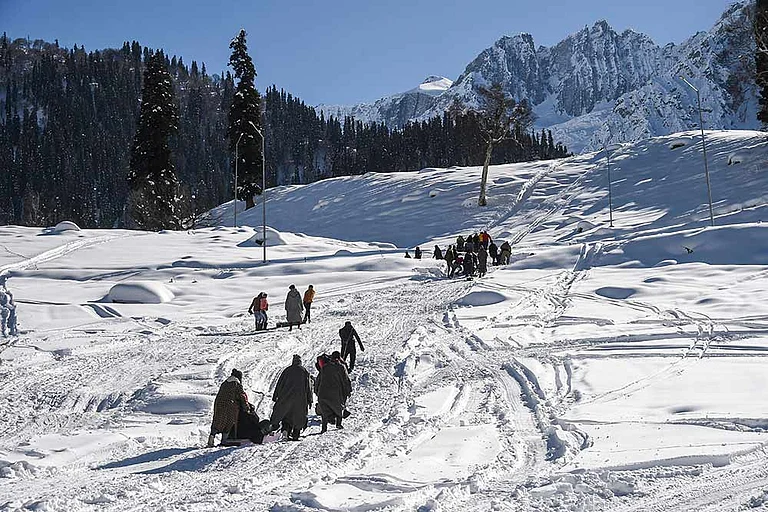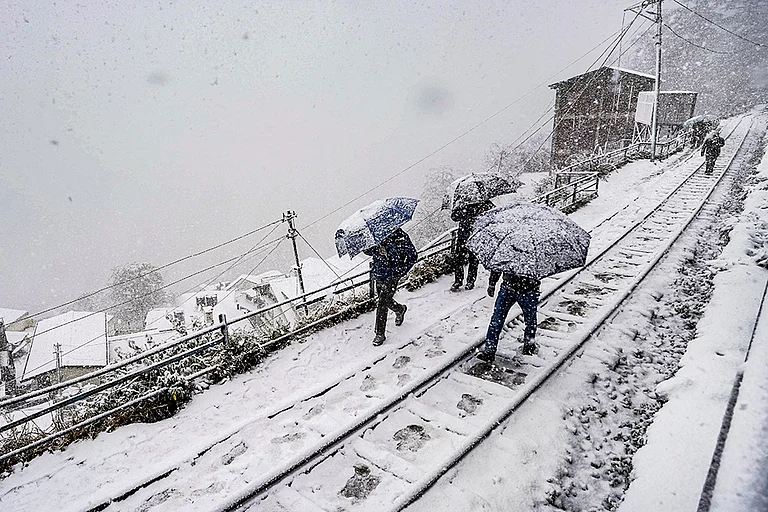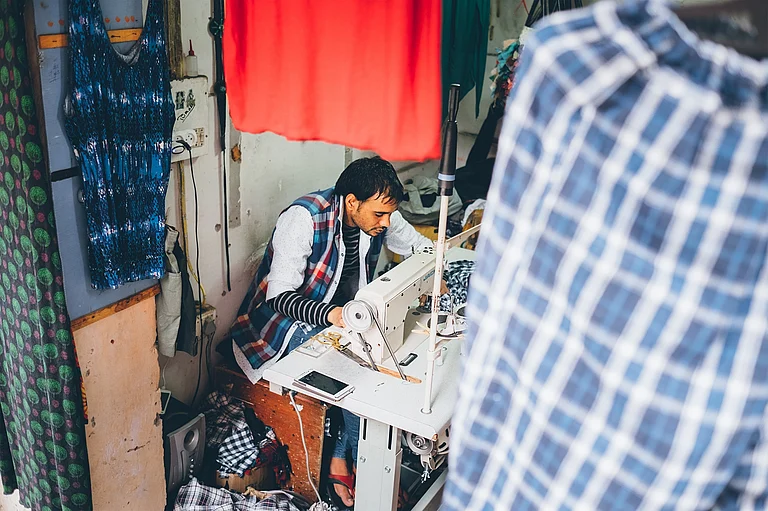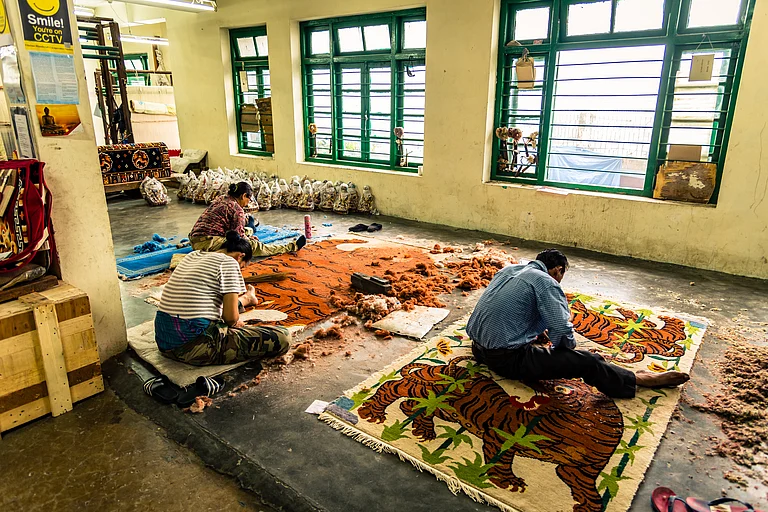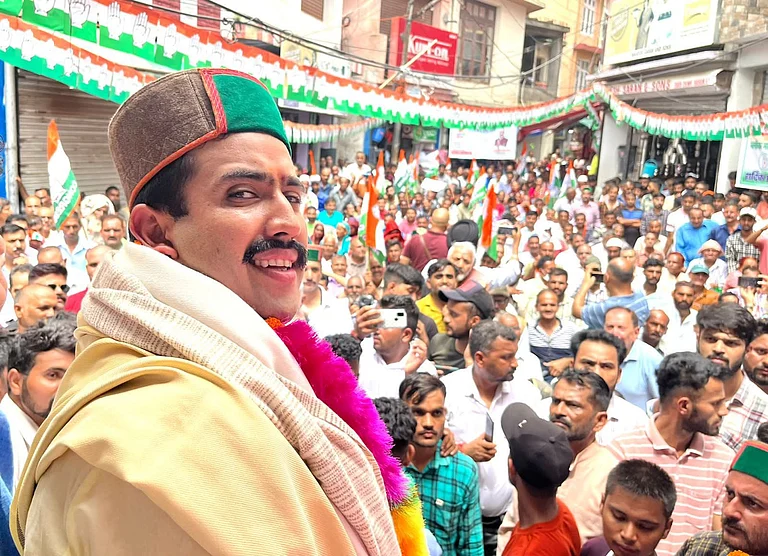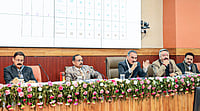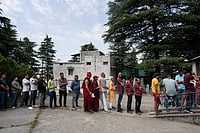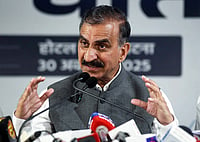Two states, not very different demographically, geographically, ecologically and even culturally–‘Dev Bhoomi’ as described by many–are engulfed in a turmoil that starkly contrasts with the region's historical legacy of communal harmony as well as politics.
In BJP-ruled Uttarakhand, signboards have been erected outside villages in the areas of Rudraprayag and other districts within the Garhwal hills, prohibiting the entry of non-Hindus, Rohingya Muslims, and hawkers.
The signboard’s text (in Hindi) reads: "Non-Hindus, Rohingya Muslims and hawkers are prohibited to do business and roam around in the village. If found anywhere in the village, punitive action will be taken”.
The targets, undoubtedly, are minorities, many of whom have migrated to and settled in the region before Uttarakhand was separated from Uttar Pradesh.
Not surprisingly, the state is already preparing to implement the Uniform Civil Code (UCC) following Prime Minister Narendra Modi's address from the ramparts of the Red Fort on the "nation's need for the UCC." Uttarakhand is set to become the first state in India to enact this law, which was passed by the state assembly in February 2024 and subsequently received presidential assent in March 2024, just ahead of the parliamentary elections.
In May-June 2023, Purola, a town in the Uttarkashi district, experienced communal tensions following an alleged attempt by two men—Ubed Khan, a local shopkeeper, and Jitender Saini—to abduct a Hindu girl. The situation escalated after a protest rally turned violent. The right-wing protesters pelted stones at Muslim properties and asked them to leave the town. As a result, many Muslim families were forced to flee their homes to ensure their safety.
The streets of Shimla in Himachal Pradesh, where the Congress made a comeback to power in the 2022 assembly elections, erupted in massive protests against a mosque, which the protesters alleged was ‘illegal and unauthorized’.
The protests, supported by Hindu organizations and joined by local residents, soon shifted focus to the presence of ‘outsiders’—specifically, Muslim street vendors—in the tourist town, alleging that these vendors were occupying all busy market spaces that were once dominated by locals.
Cabinet Minister Anirudh Singh, a senior congress MLA from Kasumpti—Shimla's suburban area—addressed concerns about the "illegal construction" of a mosque at Sanjauli but vociferously highlighted the influx of outsiders, including Bangladeshis, Rohingyas, and "suspicious persons" from Saharanpur (UP). They are the men behind thefts and petty crimes, he alleged. Furthermore, the minister expressed alarm over issues such as ‘love jihad’, which he believes could threaten the demographic balance of the state.
He spoke this in the state assembly, raising eyebrows in his party. The BJP and its related outfits were ready to grab the moment. Soon protests spread through the state from Kullu to Sirmaur, Una to Dharamshala and also to Mandi—where Muslim community members voluntarily demolished a portion of a mosque before the local Municipal Commissioner passed orders declaring it “illegal”.
In Shimla, too, as protesters defied prohibitory orders under section 163 of the Bharatiya Nagarik Suraksha Sanhita, Muslim community leaders met Shimla Municipal Commissioner Bhupendra Attri and offered to demolish “illegal" portion of a mosque or alternatively seal the "unauthorized” floors.
These developments may look sudden but highlight underlying tensions and orchestrated campaigns against religious minorities, increasingly referred to as ‘outsiders’. The situation has evolved into a broader issue of identity and belonging in the context of growing religious and ethnic divides.
Nayeem Quraishy from the Muslim Sewa Sangathan states, “A fundamental issue arises regarding who Hindutva groups label as outsiders in Uttarakhand. Many Muslim families have lived in Garhwal and other regions of Uttarakhand for decades--few are in the third generation also. These communities face planned attacks and physical violence on the pretexts of love jihad or land jihad. When a single Muslim individual is accused of a crime or an inter-religious relationship, the entire community becomes a target. This is all the BJP is doing."
Violence against minorities in Uttarakhand has increased since 2017. Following attacks on Muslim families in Chamoli district and other areas of the Garhwal hills, including Nandghat and Gopeshwar, a delegation from two organizations, including the All India Majlis-e-Ittehadul Muslimeen (AIMIM), met with Director General of Police Abhinav Kumar and gave him full chronology of incidents with proofs.
“We regret that he failed to act against the perpetrators of the communal violence. We don’t have hope from the Chief Minister Pushkar Singh Dhami, who takes the side of those who beat-up Muslims, attack him and loot their shops. The police never responds to our complaints,” he says.
The Muslim organizations have now turned to the Uttarakhand High Court to seek protection for their community. The case is slated for a hearing this week. “We are placing our trust solely in the judiciary to prevent planned violence against minorities,” stated Nayeem Quraishy ,adding that Uttarakhand has become the epicentre of 'Islamophobia' and hate crime in the country. As per him, several victim families have shut their shops and fled from their homes and they are now taking shelter either in Dehradun or fled to other places to save their lives or escape police harassment. In Himachal Pradesh, the congress government seems to be on a fire fighting mode after its own ministers having joined the chorus against illegal mosque construction at Sanjauli and also “outsiders,” mainly the vendors.
Although the focus ostensibly shifted to the illegal construction of the mosque in Sanjauli’s crowded area, the primary concern was actually related to the verification of vendors from a specific community.
“Slowly they have captured the entire city. They also own shops and run businesses like tailoring and hair cutting. One trader also has a whole-sale fruit business and he only monopolies things in Shimla. The local vendors, tailors and barbers have lost their business completely,” alleges an activist of a protesting Hindu organisation.
When asked about the issue, Suresh Bhardwaj, a former Shimla MLA and cabinet minister in the previous BJP government, stated, “There is a vendors’ policy that clearly defines designated zones for vendors and outlines requirements for verification and registration. However, due to political pressures and corruption within the municipal corporation, enforcement has been inadequate. As a result, the number of illegal vendors has increased, encroaching on streets and markets, and they often misbehave with locals.”
Bhardwaj cites the example of Kashmiri porters, known locally as "khans," who have resided in Shimla for decades. This Muslim community has coexisted peacefully with locals, facing no issues with them. In fact, some of these porters have been in Shimla for three or four generations.
Understanding why anger has increased towards certain categories of Muslims is crucial for effective intervention strategies, he says. Bhardwaj admits that everyone has a right to live anywhere, practise any profession, and to live life with dignity and freedom. He maintains the protests were spontaneous reactions of the citizens and that the BJP was not a part of it.
In the state assembly, Leader of Opposition Jairam Thakur’s reaction was also guarded. He asked for action against illegal construction of the mosque. “More you delay the action, the more protests will happen. Also, why did the government enforce the verification and registration process of vendors and migrants," he asked.
Last week, state assembly Speaker Kuldeep Pathania set-up a high level committee under senior cabinet minister Harshvardhan Chauhan to frame a policy on vendors in Shimla. Beside two other ministers—Anirudh Singh and Vikaramaditya Singh—the committee also has three BJP MLAs, and the Congress MLA from Shimla Harish Janartha.
Even as the BJP and Congress continue the slugfest, a group of citizens joined by Left-wing leaders have written to Himachal Pradesh Chief secretary Pramodh Saxena expressing concern over concerted hate campaign of the BJP-RSS combine against Muslims in the state.
“This is a clear attempt to destroy communal harmony and peace in the state which has a history of peaceful ecosystem. We have noted a similar hatred and violence being whispered up in the neighbouring states of Uttrakhand, UP and Haryana. Action must be taken to prevent this hate taking an ugly turn in Himachal Pradesh,” the letter reads.
A similar letter has also been written by a group of citizens in Uttarakhand.
“The recent events directed essentially against minorities at Paltan Bazar (Dehradun), at Chauras (Kirtinagar Block, Tehri), in Ghat block (Chamoli district) at Jhulaghat (Pithoragarh district) and in Uttarkashi have pained us deeply. Signboards have come up in Rudraprayag and Chamoli directed against 'outsiders'," wrote Dehradun–based social activist Ravi Chopra and 10 other citizens.







